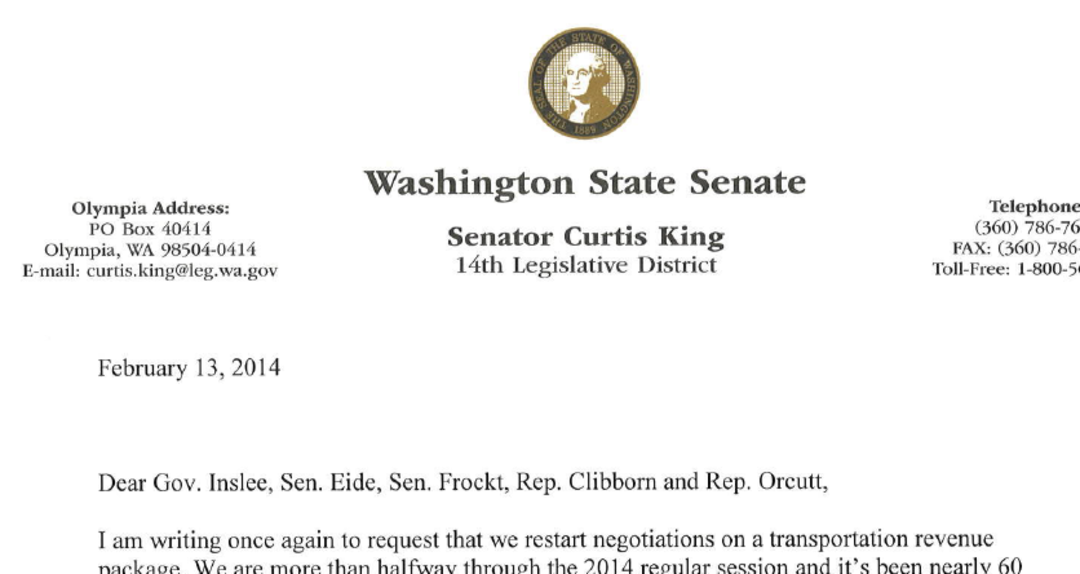MCC Says It's Finally Ready to Talk Transportation
After negotiations broke down last year and the Republicans indicated early this session that no state transportation package was forthcoming, state senate transportation committee co-chair Sen. Curtis King (R-14, Yakima) presented the Republican-dominated Majority Coalition Caucus' transportation proposal today.
The Republican senate and the Democratic house have been deadlocked over a transportation package since last session. The house actually passed a package of their own while the Republicans never passed their competing version, which has hampered the GOP's cred in negotiations.

Here's a lengthy primer we did on the differences between the two sides' proposals, but a quick recap: the Republicans want to use construction sales tax money and toxic waste cleanup money to help fund the package (the Democrats don't) and the Republicans want labor changes, such as paying apprenticeship wages (the Democrats don't).
Sen. King also noted today that he wants "congestion relief" to be added back in to the state's transportation planning goals; the goal was changed in 2008 from congestion relief to "movement of people and goods"—a change environmentalists and transit advocates pushed for in an effort to make WSDOT's mission more holistic and less roads-focused. King isn't trying to undo the "people and goods" language. (His ploy could backfire on Republicans who blanch at spending money in Seattle, though, given that the majority of the state's congestion is in King County. Thank you Sightline's Clark Williams-Derry for that bit of smarty pants liberal snark.)
King's announcement seemed more like a face-saving move for the Majority Coalition Caucus.
Both plans include a gas tax; the Democrats' plan at 10.5 cents and the new GOP plan at 11.5 cents. The Republican plan raises more money overall, about $12.4 billion to the Democrats' $10 billion, because of the road construction sales tax change and the toxic cleanup fund transfer.
There's also a difference over allocating funds: When negotiations broke down late last year, the Democrats were putting about 10 percent, or about $900 million out of a $10 billion package, to pedestrian, transit, and biking projects (the rest goes to roads), while the senate was allocating about 2 percent, $205 million out of a $12 billion package, to ped, transit, and bikes (and the rest to roads). Today, King said he was increasing the ped, transit, and bike allocation to $667 million.
"We look forward to resuming negotiations once the Senate Majority has finished negotiation amongst itself.”—Rep. Judy Clibborn
King's announcement seemed more like a face-saving move for the Majority Coalition Caucus—and its suburban Seattle leaders like Sens. Andy Hill (R-45, Kirkland) and Rodney Tom (D-48, Medina) who are up for reelection this year in moderate pro-transit districts that aren't knee-jerk against taxes and infrastructure. The MCC, dominated by anti-tax and anti-transit conservatives, has been blamed for stalling negotiations. Again: It's the senate that hasn't been able to pass a package to bring to the negotiating table.
The Democratic house transportation chair, Rep. Judy Clibborn (D-41, Mercer Island) issued a dismissive statement today:
"This new proposal casts aside many items we agreed upon [last year] and puts new, untested ideas on the table. Furthermore, it remains unclear whether this package has sufficient support to pass the other chamber. We remain insistent that the Senate Majority either pass its proposal or provide a clear demonstration that it has enough votes to pass."
The MCC tried to put the negotiating ball in the Democrats' court today, saying they had reserved the rules committee meeting room for next Wednesday to resume talks. However, Clibborn wouldn't take the bait, and concluded with this blistering rejoinder: "We look forward to resuming negotiations once the Senate Majority has finished negotiation amongst itself.”
In a letter to the Democrats Sen. King wrote: "I feel strongly that if all sides are willing to compromise...we can produce a package this session that will win the necessary 59 votes in the house and 30 votes in the senate."
The Washington State Transit Association which represents transit agencies statewide issued a statement criticizing today's MCC proposal for not funding transit; one sticking point in last year's negotiations was allowing local jurisdictions such as King County Metro to have a local option for raising taxes to fund bus service. The MCC, initially against the idea (they don't like taxes) eventually agreed to it as long as it came with a public vote. However, the WSTA says the local option isn't good enough.
In a press release from the group today, Susan Meyer, Chief Executive Officer, Spokane Transit Authority, said: “The proposal released today falls far short of the funding needed for public transportation across the state," The local options are critical, but the need for significant state investment is much broader. Overall, the proposal is not adequate, not balanced, and simply not acceptable. Extensive polling and outreach show strong public support for a robust, multimodal statewide transportation package that protects Washington residents’ mobility and economy.”
The WSTA statement continued:
A survey released by the Washington State Transportation Commission (WSTC) in November offers one of the latest reflections of the public’s strong support for transit. When asked to rank the importance of specific components of a transportation package, expanding transit is second only to support for maintaining and preserving existing infrastructure. Expanding public transit ranked higher than widening and building more roads and highways.
The survey results are part of WSTA’s Voice of Washington State (VOWS). For more information, click on this link. Nationwide, state governments provide an average of 22 percent of the funding their respective transit agencies rely on. Washington’s public transit agencies receive only 2 percent of their funding from the state, putting intense pressure on local communities. Without new significant state funding and the ability for local communities to authorize investments, our state’s residents face dramatic transit cuts, even though ridership is increasing.




